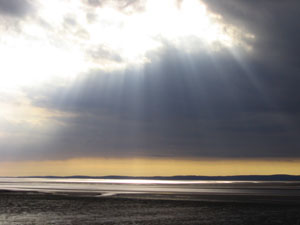Two Queens in Westminster
Henry Morford
In the Chapel of Henry the Seventh,
Where the sculptured ceilings rare
Show the conquered stone-work, hanging
Like cobweb films in air,
There are held two shrines in keeping,
Whose memories closely press:
The tomb of the Rose of Scotland,
And that of stout Queen Bess.
Each side of the sleeping Tudor
They rest; and over their dust
The canopies mould and darken
And the gilding gathers rust;
While low on the marble tablet,
Each effigied in stone,
They lie,—as they went to judgment,—
Uncrowned, and cold, and alone.
Beside them pass the thousands
Each day; and hundreds strive
To read the whole of the lesson
That knoweth no man alive,—
Of which was more to be pitied,
And which was more to be feared,—
The strong queen, with the nerve of manhood,
Or the woman too close endeared.
One weakened her land with faction,
One strengthened with bands of steel;
One died on the black-draped scaffold.
One broke on old age's wheel:
And both—O sweet heaven, the pity!—
Felt the thorns in the rim of the crown
Far more than the sweep of the ermine
Or the ease of the regal down.
Was the Stuart of Scotland plotting
For her royal sister's all?
Was it hatred in crown or in person
Drove the Tudor to work her fall?
Was there guilty marriage with Bothwell
And black crime at the Kirk of Field?
And what meed had the smothered passion
That for Essex stood half revealed?
Dark questions!—and who shall solve them?
Not one, till the great assize,
When royal secrets and motives
Shall be opened to commonest eyes;—
Not even by bookworm students,
Who shall dig and cavil and grope,
And keep to the ear learned promise.
While they break it to the hope!
Ah, well,—there is one sad lesson
Made clear to us all, at the worst:
Of two forces made quite incarnate,
And that equally blessed and cursed.
With the English woman, all-conquering
Was Power, and its handmaid. Pride;
With the Scottish walked fierce-eyed Passion,
Calling lovers to her side;
And the paths were the paths of ruin,
Of disease and of woe, to both.
With their guerdon the sleepless pillow,
And their weapon the broken troth;
And each, when she died, might have shuddered
To know she had failed to find
A content, even poorly perfect.
As that blessing some landless hind!
Ah, well, again,—they are sleeping
Divided, yet side by side;
And the lesson were far less perfect
If their sepulchres severed wide.
And well for Bess and for Marie
That the eyes, to judge them at last,
Will be free from the gloss and glamour
Blinding ours through present and past!
The two queens of the poem are Queen Elizabeth I and Mary Queen of Scots. Mary was of course beheaded on the orders of her rival Elizabeth. There are a number of other queens buried in the Henry VII Chapel including Elizabeth's sister "Bloody" Mary and Queen Anne.
